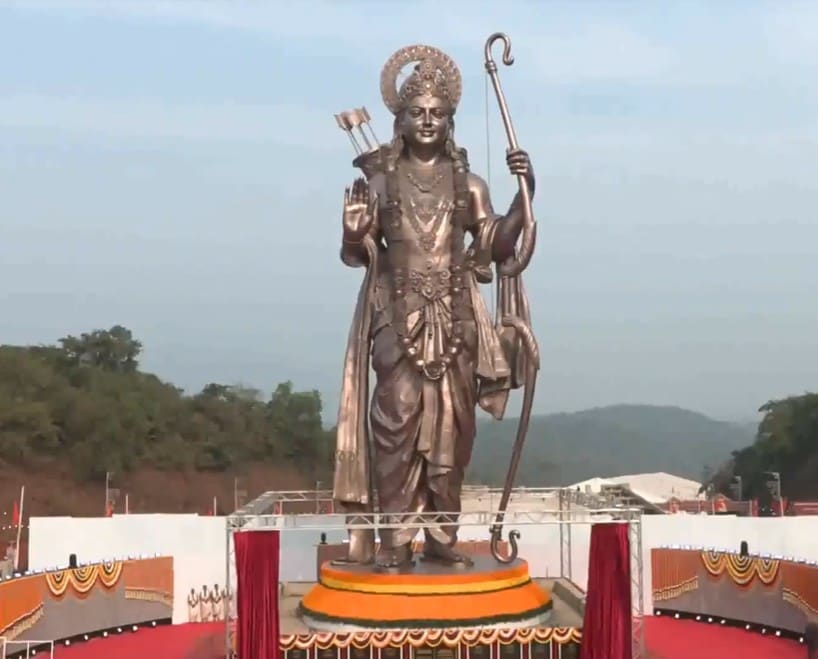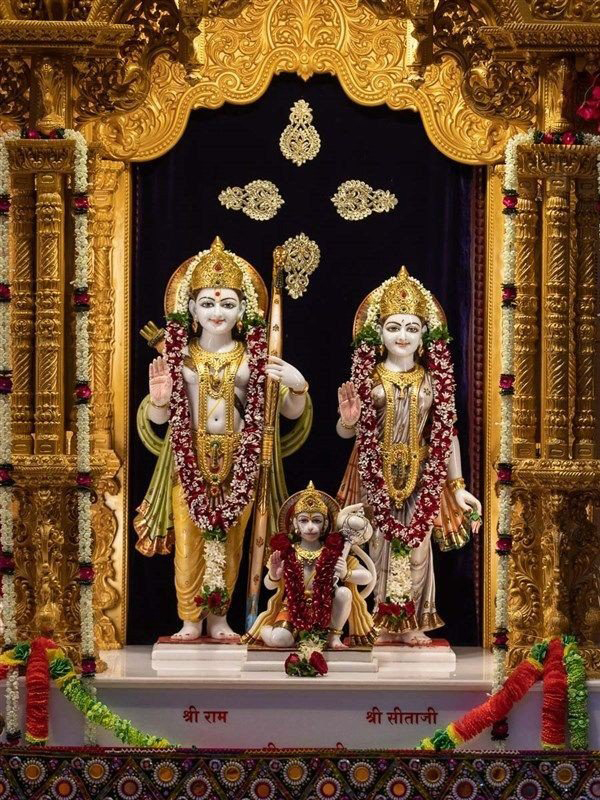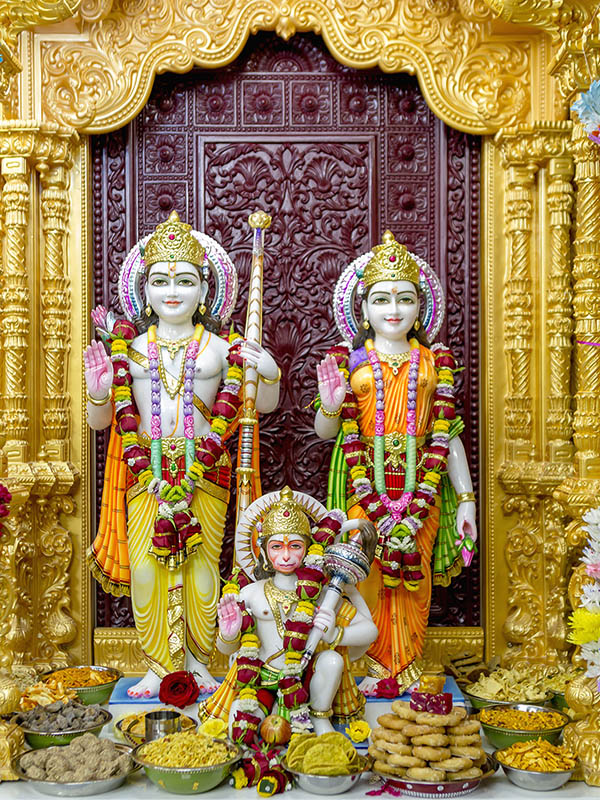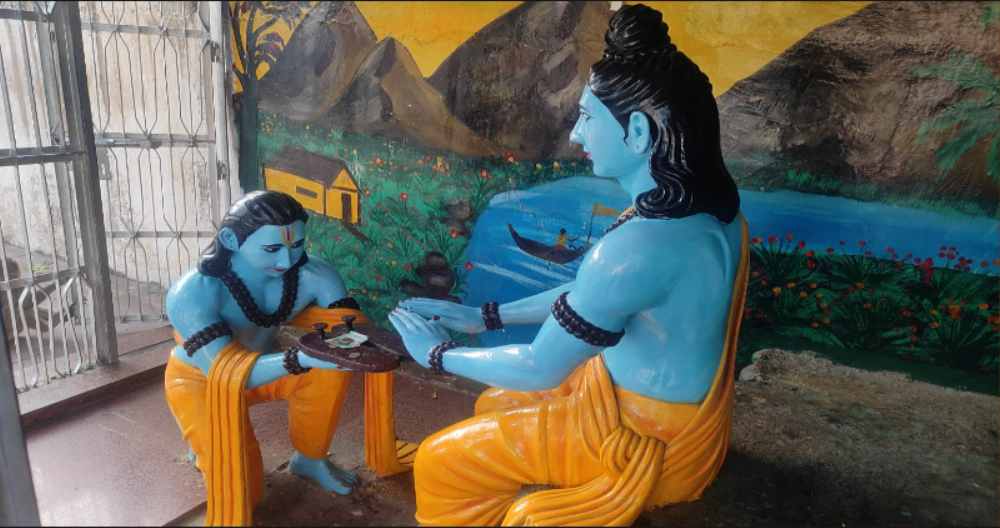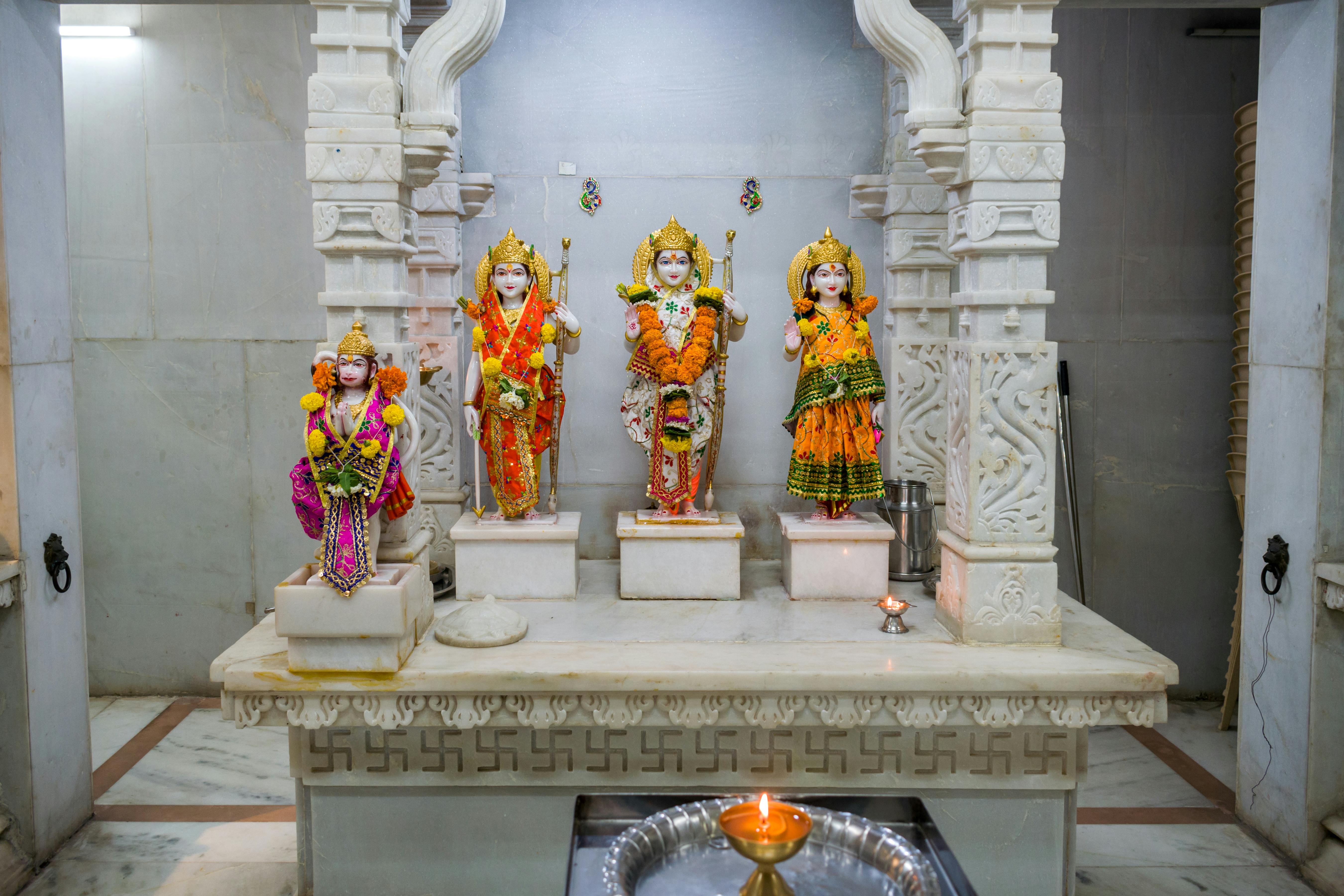A Story of Divine Love and Devotion from Ramcharitmanas
The News That Shattered a Heart
In another wing of the palace, Lakshman ji was engaged in his duties when a servant approached, hesitant and sorrowful. The words that followed struck like lightning:
“Prince Ram is leaving for fourteen years of exile. Princess Sita will accompany him.”
समाचार जब लछिमन पाए। ब्याकुल बिलख बदन उठि धाए॥
कंप पुलक तन नयन सनीरा। गहे चरन अति प्रेम अधीरा॥“When Lakshman received the news, he was filled with restlessness. With a sorrowful look, he stood and ran to find Lord Ram. His body quivered, goosebumps spread across his skin, and tears streamed from his eyes.
Overwhelmed with feelings, he rushed and held onto Shri Ram’s feet.”
The Moment of Breaking
Lakshman, the mighty warrior who had never known fear in battle, whose arrows had felled countless enemies, was reduced to a trembling child. His body betrayed his anguish:
- Kampa (trembling) – His limbs shook uncontrollably
- Pulaka (goosebumps) – Every hair on his body stood on end
- Nayana Saneera (eyes filled with tears) – His vision blurred with tears
He ran. Not walked with princely dignity, but ran, through corridors, past startled courtiers, his only thought: “Ram. I must reach Brother Ram.”
When he found his brother, he couldn’t stand. He fell at Shri Ram’s feet, clutching them as a drowning man clutches a piece of driftwood.
The Silence That Spoke Volumes
कहि न सकत कछु चितवत ठाढ़े। मीनु दीन जनु जल तें काढ़े॥
सोचु हृदयँ बिधि का होनिहारा। सबु सुखु सुकृतु सिरान हमारा॥“He was unable to say anything; he just stood there, staring at Ram like a fish out of water. Inside, he wondered, ‘Oh God, what will happen now? Have all my happiness and rewards come to an end?’Have all my joys and the fruits of my merits(Good deeds) come to an end?”
The Fish Without Water
Tulsidas ji uses perhaps the most poignant metaphor in all of literature, a fish removed from water.
A fish doesn’t thrash dramatically when taken from water. It simply gasps, its gills opening and closing, its eyes wide with the incomprehension of a world without the only element it has ever known.
Lakshman ji was that fish. Shri Ram was his water, his breath, his very element of existence.
His internal torment:
- “What will happen to me?”
- “Is this the end of all happiness?”
- “Have I exhausted all my punya (merits)?”
- “Why is fate so cruel?”
And the most heartbreaking question:
मो कहुँ काह कहब रघुनाथा। रखिहहिं भवन कि लेहहिं साथा॥“What will Raghunath say to me now? Will He want me to stay in the palace or take me to the forest with Him?”
Ram’s Body Language: Renunciation Incarnate
राम बिलोकि बंधु कर जोरें। देह गेह सब सन तृनु तोरें॥“Shri Ram saw His brother standing with folded hands, his face calm but resolute. Lakshman ji’s demeanor and expression revealed that he had abandoned all worldly bonds: body, home, and comfort, as effortlessly as one would throw away a blade of grass.”
Before Shri Ram could speak, Lakshman ji’s body spoke. He stood:
- Hands folded – In complete submission
- Eyes fixed on Lord Ram – Seeing nothing else in the universe
- Utterly still – Like one who has already died to the world
The phrase “tṛṇu toreṅ” (breaking like a blade of grass) is powerful. Lakshman had already broken all ties, not with difficulty, but as easily as snapping a dry twig. His body, his home, his royal status, all were now as insignificant as grass.
He stood as a blank page, waiting for Ram ji to write his destiny.
The Elder Brother’s Dharma
Then Ram spoke, Ram the righteous, Ram the wise, Ram who must balance love with duty.
बोले बचनु राम नय नागर। सील सनेह सरल सुख सागर॥
तात प्रेम बस जनि कदराहू। समुझि हृदयँ परिनाम उछाहू॥“Wise in justice, gentle, caring, and a vast ocean of joy, Shri Ram said, ‘O Brother, do not let grief consume you. Instead, find encouragement in your heart, for the outcome will be happy and filled with goodness.”
Ram’s Painful Logic
Ram began with wisdom, trying to soften the blow:
मातु पिता गुरु स्वामि सिख सिर धरि करहिं सुभायँ।
लहेउ लाभु तिन्ह जनम कर नतरु जनमु जग जायँ॥“Those who naturally heed the advice of their mother, father, guru, and master genuinely achieve the purpose of their existence; if not, their birth in this world is considered pointless.”
Then came the practical reasons, each one logical, each one correct, each one piercing Lakshman’s heart:
Reason 1: The Kingdom Will Be Orphaned
मैं बन जाउँ तुम्हहि लेइ साथा। होइ सबहि बिधि अवध अनाथा॥“If I take you with me to the forest, Awadh will be left entirely orphaned, without guidance or protection.”
Reason 2: Everyone Will Suffer
गुरु पितु मातु प्रजा परिवारू। सब कहुँ परइ दुसह दुख भारू॥“Great pain will come to our Guru, Father, Mothers, and the whole family.”
Reason 3: The Dharma of Kingship
जासु राज प्रिय प्रजा दुखारी। सो नृपु अवसि नरक अधिकारी॥“A King whose people suffer is surely destined for Hell.”
Final Verdict:
रहहु तात असि नीति बिचारी।“So, with this in mind, stay in Awadh.”
The Lotus Withers: Lakshman’s Reaction
सुनत लखनु भए ब्याकुल भारी॥
सिअरें बचन सूखि गए कैसें। परसत तुहिन तामरसु जैसें॥“Hearing this, Lakshman felt deep sorrow. Ram’s gentle words hit him like frost on a tender lotus, making his heart ache with grief.”
The Irony of Cool Words
Ram’s words were sītala (cool, soothing), meant to calm, to console. But to Lakshman, they were tuṣāra (frost), deadly cold.
Just as frost kills a lotus:
- Not with violence
- But with gentle, deadly cold
- The lotus simply withers, unable to survive without warmth
Similarly, Ram’s logical, dharmic words, though spoken with love, were killing Lakshman. His heart couldn’t survive in a world without Ram.
The Cry of the Devotee
उतरु न आवत प्रेम बस गहे चरन अकुलाइ।
नाथ दासु मैं स्वामि तुम्ह तजहु त काह बसाइ॥“Overwhelmed with love, he could not find the words to respond. Instead, he held Shri Ram’s feet in deep sorrow and said, ‘You are my Master, and I am Your humble servant. Even if You choose to leave me, what power do I have to resist?“
Lakshman’s response begins with silence, “uttaru na āvata” (no answer came). His throat was choked, not just with tears, but with love too vast for words.
Then he grasped Ram’s feet again, “gahē carana akulāi” (clutched feet in distress), and spoke the words that define the devotee-God relationship:
“I Am Your Servant, You Are My Master”
“Nātha dāsu maiṅ svāmi tumha”
This is not a mere declaration; it’s the essence of Bhakti philosophy:
- The devotee has no independent will
- The devotee exists only in relation to the Lord
- Abandonment by the Lord is spiritual death
“Tajahu ta kāha basāi” – “If You abandon me, what power do I have?”
This isn’t self-pity. It’s theological reality according to Bhakti tradition. The devotee without the Divine is:
- Fish without water
- Lotus without sun
- Body without soul
Lakshman’s Magnificent Defense
What follows is one of the most beautiful passages in Ramcharitmanas, Lakshman’s defense of his position. Not with arguments about duty, but with pure love.
“Your Advice Is Perfect, For Others”
दीन्हि मोहि सिख नीकि गोसाईं। लागि अगम अपनी कदराईं॥
नरबर धीर धरम धुर धारी। निगम नीति कहुँ ते अधिकारी॥“O Lord of the senses, You have given me wise and righteous advice, but my own restless and fearful nature makes it hard to follow. Only those noble souls who are patient and firmly rooted in dharma are truly fit to be guided by the teachings of the Scriptures and ethical principles.”
Lakshman’s Humility:
He doesn’t say Ram is wrong. He says:
- “Your advice is excellent”
- “But I’m too weak to follow it”
- “Such high dharma is for great souls”
- “I am not that person”
This is not false modesty; it’s spiritual honesty. He knows his nature: prema-adhīna (governed by love, not logic).
The Swan and the Mountain
मैं सिसु प्रभु सनेहँ प्रतिपाला। मंदरु मेरु कि लेहिं मराला॥“I am just a child, nurtured and protected by Your love. Can a delicate swan ever lift the weight of the mighty Mandrachal or Meru mountains?”
The Perfect Metaphor
Lakshman uses an image from nature:
The Swan (Marāla):
- Graceful, beautiful
- Floats on water effortlessly
- Symbol of discrimination (haṁsa-vṛtti)
But can it lift Mount Meru?
No. It’s not in the swan’s nature.
Similarly: Lakshman can fight demons, conquer kingdoms, master weapons. But living without Ram? That’s beyond his nature. It’s asking the impossible.
He calls himself “sisu” (child), not in age, but in dependence, a child raised by Ram’s love alone.
The Ultimate Declaration
गुर पितु मातु न जानउँ काहू। कहउँ सुभाउ नाथ पतिआहू॥“Believe me, my Lord, I speak with all my heart, other than You, I know no Guru, no Father, no Mother.”
Beyond All Relationships
This is revolutionary in Hindu dharma, which places immense importance on parents and guru.
Lakshman declares:
- Not from rebellion
- Not from disrespect
- But from complete absorption in Ram
“Kahauṅ subhāu” – “I speak from my nature”
This isn’t decision; it’s identity. Just as fire’s nature is to burn, Lakshman’s nature is to exist only for Ram.
The All-in-One Relationship
जहँ लगि जगत सनेह सगाई। प्रीति प्रतीति निगम निजु गाई॥
मोरें सबइ एक तुम्ह स्वामी। दीनबंधु उर अंतरजामी॥“In every part of the world where there are bonds of love, trust, and affection as mentioned in the Scriptures, I see all those relationships focused on You alone, my Master, O Helper of the needy, O Knower of the deepest truths of every heart.”
Lakshman’s Theology:
All relationships in the world:
- Mother’s nurturing love
- Father’s protective guidance
- Guru’s wisdom
- Friend’s companionship
- Master’s authority
All of these = Ram alone
This is Eka-nishtha (single-pointed devotion). Not rejecting other relationships, but seeing them all as manifestations of the One.
He addresses Ram with three titles:
- Svāmī (Master) – Authority
- Dīna-bandhu (Friend of the helpless) – Compassion
- Antaryāmī (Knower of hearts) – Omniscience
“You know my heart, Ram. You know I speak truth.”
The Final Argument: Love Beyond Dharma
धरम नीति उपदेसिअ ताही। कीरति भूति सुगति प्रिय जाही॥
मन क्रम बचन चरन रत होई। कृपासिंधु परिहरिअ कि सोई॥“The preaching of religion and morality is for those who desire fame, wealth, or salvation, but what about one who loves only your feet with their mind, words, and deeds? O ocean of mercy, is even such a person worthy of being abandoned?”
The Climax of Lakshman’s Plea
This is the crushing blow of Lakshman’s argument. He presents a hierarchy:
People Who Need Dharma Lectures:
- Those seeking kīrti (fame/glory)
- Those seeking bhūti (wealth/power)
- Those seeking sugati (good afterlife/moksha)
These people live in the world of desires and goals. For them, dharma and nīti (ethics) are the guidelines.
But what about someone like me?
“Mana krama bacana carana rata hoī”
One who is devoted to Your feet:
- Mana (in mind) – Constant remembrance
- Krama (in action) – Every deed for You
- Bacana (in word) – Your name on lips always
The Devastating Question
“Kṛpā-sindhu pariharia ki soī?”
“O Ocean of Mercy, should such a one be abandoned?”
This question contains:
- Kṛpā-sindhu (Ocean of Mercy) – Appealing to Ram’s compassionate nature
- Pariharia (to be abandoned) – The unbearable possibility
- Ki (should/question particle) – Making Ram answer his own heart
The Implied Answer:
“You are the ocean of mercy. Your very nature is compassion. How can You, the refuge of refugees, abandon one who has nowhere else to go?”
What This Passage Teaches Us
1. The Nature of True Devotion
Lakshman embodies Ananya Bhakti (exclusive devotion):
- No backup plans
- No alternative refuges
- Complete dependence on the Divine
2. Love vs. Dharma
The passage presents an apparent conflict:
- Ram speaks from Dharma (righteousness, duty, social order)
- Lakshman speaks from Prema (pure love, complete surrender)
Tulsidas ji doesn’t resolve this easily. Both are valid. But he shows that for the true devotee, love transcends even dharma.
3. The Devotee’s Rights
Lakshman essentially claims: “I have no rights except one, the right to serve You.”
This is Dāsya Bhāva (servant attitude) at its purest:
- Not demanding
- But lovingly reminding the Lord of His own nature as Protector
4. God’s Dilemma
The beauty is that Tulsidas shows Lord Ram conflicted. He:
- Knows Lakshman’s love is real
- Knows the practical difficulties
- Must choose between dharma and devotee
This humanizes Shri Ram while maintaining his divinity. He feels, He struggles, He loves.
Lakshman’s Approach: The Way of Pure Bhakti
What Lakshman Does:
- ✅ Complete honesty – “This is my nature”
- ✅ Total surrender – “I have no will but Yours”
- ✅ Persistent plea – “Please don’t leave me”
- ✅ Appeal to God’s nature – “You are mercy itself”
What Lakshman Doesn’t Do:
- ❌ Argue with scriptures
- ❌ Claim to be righteous
- ❌ Demand his rights
- ❌ Use emotional manipulation
His is the plea of pure love, naked, vulnerable, irresistible.
The Unspoken Question
As the passage ends here, we’re left with the question:
What will Ram say?
Will He:
- Maintain His dharmic position and ask Lakshman to stay?
- Yield to love and take Lakshman along?
- Find a third way that honors both duty and devotion?
The beauty of Tulsidas’s writing is that he makes us feel the tension, the impossible choice, the pain of both brothers.
The Essence of Bhakti
This episode from Ramcharitmanas is not just a story; it’s a manual of devotion.
Reflection
The next time you feel:
- Abandoned by God
- Unable to follow all the rules
- That your love is all you have to offer
Remember, Lakshman, standing before Ram, trembling like a fish without water, with nothing to offer but pure, helpless, total love.
And know that this is enough.
In fact, in the economy of Bhakti, this is everything.
Jai Siya Ram 🙏
Even a fraction of Lakshman ji’s devotion, where the Lord becomes all-in-all, and living without Him becomes impossible, unthinkable, unbearable, and in that impossibility lies the possibility of the highest union.


